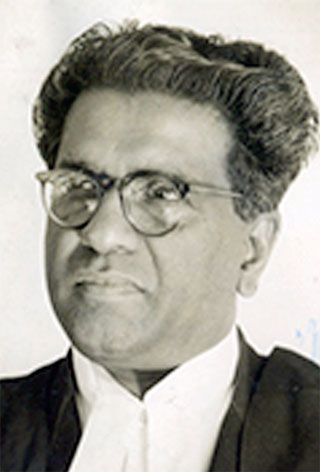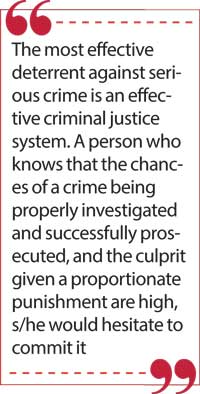Tuesday Feb 17, 2026
Tuesday Feb 17, 2026
Friday, 10 March 2023 00:40 - - {{hitsCtrl.values.hits}}

Dr. Colvin R. de Silva

Chandrika Kumaratunga

Maithripala Sirisena

Sajith Premadasa

“The greatest deterrent to crime is the likelihood that offenders will be apprehended, convicted and punished. It is that which is presently lacking in our criminal justice system; and it is at this level and through addressing the causes of crime that the State must seek to combat lawlessness” – Justice Chaskalson, in the South African Constitutional Court case of State v. Makwanyane
 On 26 June 2019, President Sirisena, who had been for some time talking about the need for the resumption of capital punishment in respect of serious drug offenders, announced that he had signed the necessary papers to execute four drug offenders. His decision to reverse Sri Lanka’s 43-year-old moratorium on capital punishment evoked concern both in and outside the country, including from the UN Secretary-General.
On 26 June 2019, President Sirisena, who had been for some time talking about the need for the resumption of capital punishment in respect of serious drug offenders, announced that he had signed the necessary papers to execute four drug offenders. His decision to reverse Sri Lanka’s 43-year-old moratorium on capital punishment evoked concern both in and outside the country, including from the UN Secretary-General.
The decision was challenged in the Supreme Court by several petitioners who contended that it had been recognised and is an accepted norm that drug-related offences are not classified among the most serious types of offences. There was thus no rational basis for the President’s selective choice of whom to execute, especially considering that he has commuted the death sentences of persons convicted of far more serious types of crimes. It was also an act which would have far-reaching consequences on the country and its citizenry and is irreversible. It cannot, therefore, be carried out based on the whims and fancies of one person acting contrary to the position of the State as a whole.
Many death row inmates have been in post-conviction custody for a long period of time, and the belated implementation of the death penalty would be contrary to due process of law. The President’s decision to implement the death penalty was thus arbitrary and irrational and violative of Article 12(1) of the Constitution. It was further contended that even if the implementation of the death penalty was permissible, death by hanging is a cruel and inhumane method of execution (compared to more humane forms such as lethal injection) and, as such, also amounts to cruel, inhumane and degrading treatment within the meaning of Article 11 of the Constitution. Executing the death penalty on persons who have already served a long period of imprisonment amounted to a dual punishment: lengthy incarceration under very severe conditions followed by an execution.
On 5 July 2019, the Supreme Court issued an interim order staying the execution of the death penalty. The interim order was extended from time to time. On 23 February 2023, the Attorney-General informed the Court that President Wickremesinghe would not sign any warrant of execution. The Court terminated the proceedings, reserving the right of the petitioners to revive the cases in the event of an imminent threat of any execution being carried out in the future.
A few days later, on 1 March 2023, Opposition and SJB leader Sajith Premadasa told an election rally that those convicted of terrorism, including the Easter bombings, and trading in drugs would be executed under an SJB government even though that would be opposed by liberals. SJB stalwart Eran Wickramaratne was quick to respond that the SJB did not have an official position on the death penalty. On 22 October 2020, Premadasa had told Parliament that the death penalty should be carried out on those convicted of terrorism and involvement in the drugs trade as a business. When Minister Sabry asked him whether that was his personal opinion or that of his party, Premadasa confirmed that it was the position of the party. Eran Wickramaratne, an economist and a liberal, is no doubt aware of the consequences of his Party speaking in favour of the death penalty even while in the Opposition, leave alone executing convicts when in power. After President Sirisena began talking about resuming the death penalty, Heads of Missions (HoMs) of the European Union in Sri Lanka called for abolishing the death penalty after meeting a group of government legislators. “The HoMs reiterated their call to Sri Lanka to maintain its moratorium on the death penalty with a view towards complete abolition. During the meeting, the HoMs restated the strong and unequivocal opposition of the EU and its Member States to capital punishment in all circumstances and in all cases,” a statement from the EU Delegation in Sri Lanka said. “If Sri Lanka resumes capital punishment, Colombo will immediately lose the GSP Plus status,” an EU diplomatic source had told the AFP.
Premadasa’s position is not new. When MPs Hirunika Premachandra and Ranjan Ramanayake moved an adjournment motion in the last Parliament in October 2015, calling for the execution of those convicted of raping children and killing them, Premadasa expressed similar views. The large majority of Members who spoke on the motion were opposed to the death penalty both from a human rights perspective as well as a criminal justice point of view.
The writer participated in the debate and cited the landmark case of State v. Makwanyane where the South African Constitutional Court held that the death penalty was inconsistent with the Interim Constitution of South Africa. Justice Chaskalson famously stated that the greatest deterrent to crime is not the death penalty but “the likelihood that offenders will be apprehended, convicted and punished,” adding what is true for most countries: “It is that which is lacking in our criminal justice system.”
The Left in Sri Lanka has always been against the death penalty. Dr. N.M. Perera, speaking in the State Council on 20 November 1936, opposed the idea of ‘an eye for an eye, a tooth for a tooth.’ During the Parliamentary debate to abolish the death penalty in 1956, Dr. Colvin R. de Silva said, “Of all things that the State may take away from man, there is one thing which if you take away you cannot only not return, but you can never compensate him for, that is his life. You may put a man in prison and deprive his liberty. You cannot, of course, return him the days he was in prison, but you may in some degree compensate him in other ways for the wrong that is recognised to have been done when you locked him away. But if you take his life, you may compensate his dependants and his relatives but never, can you give him anything adequate or inadequate, to replace that which was taken from him, once you are dead you may never brought to life again.”
Being one of the finest criminal lawyers this country has produced, Dr. de Silva surely knew the frailties of our criminal justice system. In Makwanyane, Justice Mahomed commented on the irreversibility of the death penalty if it is later found that an innocent person had been executed: “Its inherently irreversible consequence, makes any reparation or correction impossible, if subsequent events establish, as they have sometimes done, the innocence of the executed or circumstances which demonstrate manifestly that he did not deserve the sentence of death.”
 Innocent but sentenced/executed
Innocent but sentenced/executed
Criminal justice history is replete with cases of innocents executed, including from countries claiming to have better criminal justice processes. In England, Timothy Evans was executed in 1950 for murdering a woman. Three years later, serial killer John Christie admitted responsibility for killing six women, including the woman Evans purportedly killed! In Russia, in February 1994, serial killer Andrei Chikatilo was executed for the highly publicised murders of 52 people. The authorities acknowledged that they had previously executed the ‘wrong man,’ Alexander Kravchenko, for one of the murders in their desire ‘to stop the killings quickly.’
Knee-jerk reactions to terrorism at the expense of human rights are common. The cases of the Guildford Four and the Maguire Seven related to the conflict in Northern Ireland may be mentioned. Four persons were sentenced to life imprisonment in 1975 in the Guildford Four case, convicted of bombings carried out at the Guildford Pub in 1974 by the Provisional Irish Republican Army. The Guildford Four’s claims that their confessions had been extracted by force were rejected by the trial court. The court expressed regret that the Four had not been charged with treason, which still carried the death penalty. Years later, evidence pointing to the innocence of the accused but concealed from the trial court surfaced. They were released in October 1989 after their convictions were quashed on the basis of the evidence discovered.
The Maguire Seven were charged with possessing nitroglycerine, allegedly passed to the IRA to make bombs, in December 1974. They were tried and convicted in 1976 despite the accused claiming their alleged confessions were obtained under severe duress. They were sentenced to imprisonment, and their appeals failed. Later, evidence that the London Metropolitan Police beat some of the accused into confessing to the crimes and withheld information that was favourable to them surfaced. This led to the convictions being quashed in 1991 in a special appeal.
H.G. Dharmadasa, a former Commissioner of Prisons, who witnessed seven judicial hangings, told the Daily FT in July 2019 that there is no guarantee that an innocent would not be executed, however watertight the case may seem. “Judges and juries can make mistakes, and the manner in which crimes are sensationalised in the media often blur the line between fact and fiction and can influence judgments. You can hang 100 guilty men, but if you hang one innocent man, the system is a failure,” Dharmadasa opined.
Worldwide trend towards abolition
Internationally, there is a clear trend towards abolishing the death penalty. According to Amnesty International, while more than 106 countries had abolished the death penalty by July 2018, eight have abolished it for ordinary crimes, and 28 have not implemented it for at least 10 years. Fifty-five countries have retained capital punishment. By the end of 2021, 108 countries, a majority of all countries, had abolished the death penalty in law for all crimes, while 144, more than two-thirds of all countries, had abolished it in law or practice.
The committee appointed by the Inter-Ministerial Committee on Human Rights to draft a new fundamental rights chapter for the Constitution that accords with Sri Lanka’s international obligations recommended the abolition of the death penalty in its report submitted in November 2009.
The committee stated that it was not unmindful of public concerns that the crime rate in Sri Lanka is on the increase and that some persons convicted of grave crimes and sentenced to life imprisonment or long terms come out of prison quite early. The solution to this is judicial control of parole. It recommended that in respect of those who are sentenced to long periods of imprisonment, legal provision should be made for the sentencing judge to make an order that the offender’s term of imprisonment should not be reduced unless authorised by the court in the circumstances and manner and to the extent provided by law.
The committee noted that no person had been executed in Sri Lanka since 1975 and that in both 2007 and 2008, Sri Lanka voted at the United Nations in favour of resolutions calling for a moratorium on executions as a step towards the ultimate abolition of the death penalty. The 2007 resolution referred to, which was affirmed in 2008, declared “[t]hat the use of the death penalty undermines human dignity, and convinced that a moratorium on the use of the death penalty contributes to the enhancement and progressive development of human rights, that there is no conclusive evidence of the deterrent value of the death penalty and that any miscarriage or failure of justice in the implementation of the death penalty is irreversible and irreparable.”
Sri Lanka voted again in 2010 in favour of a moratorium on the death penalty but abstained in 2012 and 2014 during the second term of President Mahinda Rajapaksa. Sri Lanka again voted in favour in 2016 and 2018. The ‘yes’ vote has been increasing consistently. In 2018, 121 out of the 193 member states voted ‘yes’, 35 opposing, and 32 abstaining. The 2020 vote was 123 in favour, 38 votes against, 24 countries abstaining and eight absent. On 15 December 2022, the General Assembly adopted the ninth resolution for a moratorium with 125 votes in favour (2 more than in 2020), 37 votes against, 22 abstentions and nine absent. Sri Lanka voted in favour both in 2020 and 2022.
Is the death penalty a deterrent?
One of the most common arguments in favour of the death penalty is that it is a deterrent against serious crime. If that is the case, serious crime figures in jurisdictions with the death penalty should be lower than in those that do not have the death penalty.
Not all states in the United States have the death penalty. Murder rates in death penalty states and non-death penalty states show unmistakably that the death penalty is not a deterrent at all. The given table showing murder rates has been prepared based on the FBI’s Uniform Crime Reports and published on the website of the Death Penalty Information Centre (https://deathpenaltyinfo.org). Murder rates have been calculated by dividing the number of murders by the total population in the death penalty and non-death penalty states, respectively and multiplying that by 100,000.
A poll of 500 Police chiefs in the United States was conducted in 2008 by R.T. Strategies of Washington, DC. When asked to name one area as ‘most important for reducing violent crime’, Police chiefs ranked the death penalty last. They considered issues such as increasing the number of police officers, reducing drug abuse, and creating a better economy as higher priorities.
Michael L. Radelet, Chair Professor of Sociology at the University of Colorado-Boulder, in his 2009 article ‘Do Executions Lower Homicide Rates?: The Views of Leading Criminologists’ published in the Journal of Criminal Law and Criminology, stated: “Our survey indicates that the vast majority of the world’s top criminologists believe that the empirical research has revealed the deterrence hypothesis for a myth. ... 88.2% of polled criminologists do not believe that the death penalty is a deterrent. ... 9.2% answered that the statement ‘[t]he death penalty significantly reduces the number of homicides’ was accurate. ... Overall, it is clear that however measured, fewer than 10% of the polled experts believe the deterrence effect of the death penalty is stronger than that of long-term imprisonment. ... Recent econometric studies, which posit that the death penalty has a marginal deterrent effect beyond that of long-term imprisonment, are so limited or flawed that they have failed to undermine consensus. In short, the consensus among criminologists is that the death penalty does not add any significant deterrent effect above that of long-term imprisonment.”
Justice Thurgood Marshall, in his concurrent opinion in the landmark US case of Furman v. Georgia, stated: “It is generally agreed between the retentionists and abolitionists, whatever their opinions about the validity of comparative studies of deterrence, that the data which now exist show no correlation between the existence of capital punishment and lower rates of capital crime. Despite the fact that abolitionists have not proved non-deterrence beyond a reasonable doubt, they have succeeded in showing by clear and convincing evidence that capital punishment is not necessary as a deterrent to crime in our society. In light of the massive amount of evidence before us, I see no alternative but to conclude that capital punishment cannot be justified on the basis of its deterrent effect.”
Lee Sarokin, a former US Court of Appeals Judge, says in his 2011 article ‘Is It Time to Execute the Death Penalty?’ published on the Huffington Post website: “In my view, deterrence plays no part whatsoever. Persons contemplating murder do not sit around the kitchen table and say I won’t commit this murder if I face the death penalty, but I will do it if the penalty is life without parole. I do not believe persons contemplating or committing murder plan to get caught or weigh the consequences. Statistics demonstrate that states without the death penalty have consistently lower murder rates than states with it, but frankly, I think those statistics are immaterial and coincidental. Fear of the death penalty may cause a few to hesitate, but certainly not enough to keep it in force.”
It is clear from the above that the most effective deterrent against serious crime is an effective criminal justice system. A person who knows that the chances of a crime being properly investigated and successfully prosecuted, and the culprit given a proportionate punishment are high, s/he would hesitate to commit it.
The writer wishes to conclude this article with an anecdote. The issue of reinstating the death penalty came up for discussion in the second term of President Chandrika Bandaranaike Kumaratunga, with several Ministers also speaking in favour. Concerned by these reports, several persons suggested that I ‘counsel’ President Kumaratunga on the issue. I met the President, armed with facts and figures. I was barely into my second sentence when she cut me short, ending my shortest conversation with her on any subject, saying: “Anybody can suggest, but it is I who has to sign the warrant of execution. I will never do that.” This was a person whose father and husband were both assassinated and whom herself had narrowly escaped assassination while losing one eye.